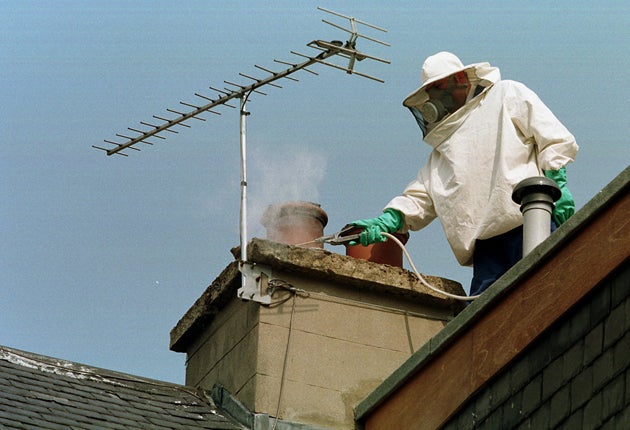Make a living out of wasps and rats
After a four-day course in pest control you're ready to set up in business. Hazel Davies reports on an unusual job opportunity

The World Health Organisation (WHO) is taking cockroaches, rats and unwanted birds seriously. Last year it published a ground-breaking report, Public Health Significance of Urban Pests, which for the first time collated research on the effects of increased pest management and what to do about it. It also highlighted the need for properly trained pest controllers.
The National Pest Technicians Association is the premier professional membership association in the UK, with just over 750 members. Adrian Batty, who runs AB Pest Management in Brough, East Yorkshire, and entered the profession through public health in the late 1960s, is one of them. Having studied science at A-level, he found work as a health inspector and did a four-year diploma in public health before working his way through various departments in public health, eventually landing his own specially created post as pest control manager.
"At that time," says Batty, "we had 21 manual workers as pest controllers, operating on bicycles and mopeds with panniers of poison. It wasn't working very well, so we set up a more efficient system, trained the workers and put them into modern equipped vehicles."
In those days, says Batty, there were big problems with cockroaches living in dirty nooks and crannies, and in drains. "In Hull we almost eliminated them from houses, swimming pools and other institutions, but they are starting to become a problem again."
One of the main problems with rats, says Batty, is that builders leave new drains open – old rats come out and new rats go in: "Building sites are not known for their cleanliness and we have had all sorts of stories of builders feeding their sandwiches to them."
The best and worst thing about his job, he says, is that you never know what you might find. "A body that's lain undiscovered for a while can be quite unpleasant – and it's usually discovered when a neighbour reports maggots under the door."
It's a myth that pest controllers are blood-thirsty men in flat caps with border terriers or working for large multinationals with Michael Clayton-style secrets.
"We still sometimes bear the tag of rat catcher," he agrees. "But these days we don't talk about pest control, we talk about pest management. Insect problems can be controlled by levels of moisture, for example. Good pest controllers try to find the reason and pesticides really are a last resort much of the time."
The job attracts its critics and, in some cases, violent recriminations. "There are groups who get very upset about the control of pigeons," says Batty. "However, it's very important. Unlike other birds, their nests are made mainly of faeces and they breed rapidly. We still really don't know the full extent of the diseases they spread."
Batty now works as an independent pest controller and consultant for Killgerm in Yorkshire, one of Europe's biggest suppliers of pest control products. He also runs training courses.
"You don't have to have a qualification to be a controller, but suppliers will generally only work with you if you can show that you are trained and competent."
He runs an eight-and-a-half day Royal Society for the Promotion of Health course in pest control, usually aimed at environmental health officers. For budding pest controllers he advises contacting local authorities and larger companies who might be willing to take on a novice and provide the training.
Shamin Dein launched Aktiv Pest Control in Bedford in May this year. She stumbled into the profession after finding a wasp's nest at her house. "The pest controller simply found the entrance to the nest and sprayed an insecticide," she says. "It took ten minutes and I was charged £40. It was necessary and did the job, but it got me thinking."
Dein and her husband, who also run a cleaning company, thought the two professions would dovetail nicely so they did a four-day practical course in pest and vermin control and set up on their own.
Though there is a range of non-toxic pest management methods, working in the industry can mean exposure to potentially harmful chemicals so sufferers of asthma need not apply. On average the pay is £15,000 to £25,000 a year. And it's still a male-dominated profession. "They usually don't expect a Pakistani woman to turn up," says Dein. "But I really love the feeling that I am helping – often very concerned – people."
For details of training contact:
British Pest Control Association (www.bpca.org.uk), National Pest Technicians Association (www.npta.org.uk), National Pest Advisory Panel (www.cieh-npap.org).
Join our commenting forum
Join thought-provoking conversations, follow other Independent readers and see their replies
Comments
Bookmark popover
Removed from bookmarks